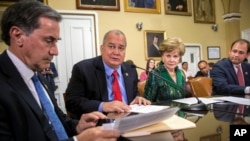The U.S. Supreme Court on Monday refused to allow Puerto Rico to restructure its debt, leaving the U.S. territory at risk of a default unless Congress can pass debt relief legislation.
The court ruled 5-2 that federal bankruptcy law does not allow Puerto Rico to enact its own legislation, over creditor objections, to cut billions of dollars in debt.
Puerto Rico, which is facing $70 billion in public debt, passed a law in 2014 that would have restructured the debt of its financially struggling public utilities.
Lower courts struck down Puerto Rico's law, citing federal legislation that allows U.S. states, but explicitly not Puerto Rico, to place their cities or utilities into federal bankruptcy protection.
The Supreme Court's agreement with the lower courts closed off one of the few paths that Puerto Rico had to resolve the crisis. Now, the territory must wait to see whether the U.S. Senate will approve a bill to allow a federally appointed board to help the territory renegotiate its debt. The House passed the measure last week.
U.S. lawmakers are focusing on a July 1 deadline, when about $2 billion in payments to Puerto Rico's creditors are due.
About 45 percent of Puerto Rico's 3.5 million people live in poverty, which has forced scores of them to flee to the U.S. mainland.
Puerto Ricans are U.S. citizens but cannot vote in presidential elections. The island has a nonvoting member of Congress.













